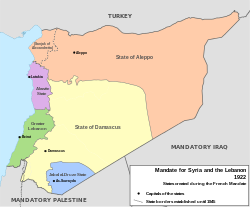State of Aleppo
| State of Aleppo | ||||||||||
|
État d'Alep دولة حلب |
||||||||||
| Mandate of France | ||||||||||
|
||||||||||
| Capital | Aleppo | |||||||||
| Languages |
French Arabic |
|||||||||
| Political structure | League of Nations Mandate | |||||||||
| Historical era | Interwar period | |||||||||
| • | Mandate granted | 1 September 1920 | ||||||||
| • | Federation established | 22 June 1922 | ||||||||
| • | Unification of Aleppo and Damascus | 1 December 1924 | ||||||||
|
||||||||||
The State of Aleppo (1920–1924; French: État d'Alep; Arabic: دولة حلب Dawlat Ḥalab) was one of the five states that were established by the French High Commissioner in Syria and Lebanon General Henri Gouraud in the French Mandate of Syria which followed the San Remo conference and the collapse of King Faisal I's short-lived monarchy in Syria.
The other states were the State of Damascus (1920), the State of Alawites (1920) and the State of Jabal Druze (1921). The State of Greater Lebanon (1920) became later the modern country of Lebanon. The capital of the State of Aleppo was Aleppo.
The State of Aleppo was declared by the French General Henri Gouraud on 1 September 1920 as part of a French scheme to make Syria easier to control by dividing it into several smaller states. France became more hostile to the idea of a united Syria after the Battle of Maysaloun. The State of Aleppo included the Sanjak of Alexandretta and was governed by Kamil Pasha al-Qudsi.
...
Wikipedia


